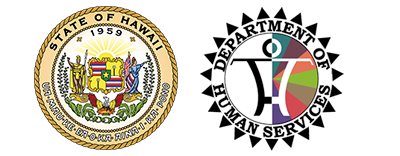Resource Caregivers Receive Increased Board Payments, Effective July 2014
Posted on Jul 23, 2014 in NEWSFamilies that care for children placed with the Department of Human Services (DHS) Child Welfare Service (CWS) Branch will receive a foster board pay increase, effective July 1, 2014. Called resource caregivers, families will receive their first increased payment in August.
To ensure that resource caregivers receive the funds necessary to provide safe, healthy, and nurturing environments for children awaiting permanent placement, the DHS requested a legislative appropriation of $8,502,936 in 2014. The budget request was passed in its entirety as part of Governor Neil Abercrombie’s 2014 executive budget package.
“Hawaii’s rate increase is based on the DHS’ review of foster care rates and practices in 46 other states,” explained DHS Director Patricia McManaman, “and the benefits that Hawaii resource families currently receive in addition to tax-free monthly foster care payments.”
Children enter and exit the foster care system throughout the year. They can remain in resource family homes for days, months, or years in some cases. While siblings are often placed together, resource families also may care for two or more unrelated children. In 2013, the average number of children per month in resource homes was 1,096. In June 2014, a total of 1,156 children were in foster care across the State.
Representative Mele Carroll, Chair of the House Committee on Human Services, was a strong supporter of increasing foster board payments. “The bill is a huge step forward to help support the foster families that are integral members of our communities.” Her Senate counterpart, Senator Suzanne Chun Oakland agreed. “I am very happy with the passage of this legislation and am grateful to the Department of Human Services, Governor, Legislature, advocates and foster families for this team effort!”
The increase in basic board payment also applies to families eligible for adoption assistance, permanency assistance, youth receiving higher education board allowance payments, and to young adults who choose to enroll in DHS’ new program of extended Voluntary Care to Age 21.
Foster board payment rates vary across the nation. Hawaii based its new rates on an age-tiered system indexed to documented costs contained in the United States Department of Agriculture’s Expenditures on Children by Families annual report. The monthly per child payment to Hawaii resources caregivers has been increased from a base rate of $529 to $575 for 0-5 year olds, $650 for 6-11 year olds, and $676 for children aged 12 and above.
Similar to other states, Hawaii’s resource caregivers also receive QUEST health insurance benefits for their foster children, difficulty of care payments, and a clothing allowance. Difficulty of care payments are provided to resource caregivers that support children who require more intensive physical, emotional, psychological or behavioral care and supervision, as determined by a treating professional.
Resource families also are eligible to receive special circumstances or events payments, designated transportation costs (school bus fare or private car mileage, local bus fare) that effect child placement or promote family reunification, and $500 per child per year for extracurricular activities, social activities, hobbies, and camp funds.
Reimbursable costs include attendance at authorized meetings, respite care and child care coverage, limited liability insurance training, and enhancements necessary for the child’s growth and development (e.g. Scouts, YMCA, YWCA, community soccer, community baseball, community swimming, Boys and Girls Clubs).
To learn more about becoming a resource care giver or attending one of the statewide informational briefings, please visit the DHS website www.humanservices.hawaii.gov/ssd/home/child-welfare-services/foster-and-adoptive-care/
Media Contact:
Kayla Rosenfeld, Public Information Officer
586-4892; [email protected]
www.humanservices.hawaii.gov
